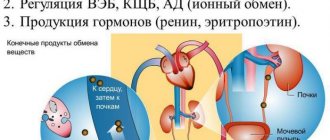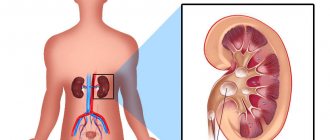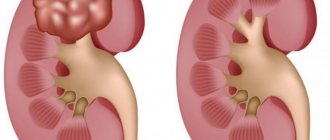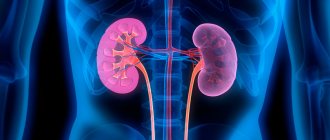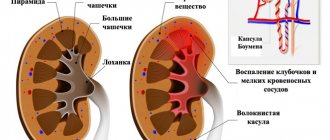The role of the kidneys is difficult to overestimate. In the human body, they perform not one, but several functions at once: urinary, endocrine, ion-regulating, metabolic. They actively participate in the process of hematopoiesis. Every three minutes, the entire volume of human blood passes through the kidneys. And per day they pass through about 1700-2000 liters. At the same time, the blood is filtered and freed from harmful substances.
Basic kidney function
The kidneys are a paired organ that performs a filtration function in the human body. The main functions of the body include:
- endocrine;
- hematopoietic;
- urinary;
- metabolic;
- ion-regulating.
The main task of all functions is aimed at cleansing the blood of toxic substances, their natural removal, as well as the production of hormonal substances.
For information! The effect of alcohol on the kidneys causes the renal tubules to malfunction, resulting in damage to other important organs.
For every 3 minutes, the organ passes blood through itself, which undergoes thorough filtration and cleansing of various poisons and toxins.
Kidneys and alcohol: what abuse leads to
The simplest demonstrative evidence of the negative effect of alcohol on the body is swelling on the faces of drinkers. But these are just external manifestations. What’s happening inside is much worse: calcium, magnesium and phosphates are washed out of the body, and bone demineralization occurs. With prolonged abuse of large doses of alcohol, kidney dystrophy occurs. The structure of the kidney tissue changes, which interferes with the normal functioning of this organ. If the patient continues to abuse alcohol, then at some point the process of tissue restoration becomes impossible and necrosis occurs.
Kidney failure is a common disease among people who drink. It is characterized by a reduced volume of urination or complete absence of urine. There is a violation of the acid-base and water-electrolyte balance. As a result, the cardiovascular and other systems begin to suffer. If you do not reconsider your attitude towards alcohol, this kidney disease leads to tubular necrosis, which can result in a coma.
Regular consumption of alcohol significantly increases the risk of developing cancer. Of course, not everyone who abuses it will develop cancer. But according to research by scientists, malignant tumors appear more often in people who drink. If, as a result of oncology, one kidney is removed and no metastasis is detected, then this is still the most favorable outcome (as far as possible in such a situation). Otherwise, the outcome is very sad.
https://youtu.be/jg6ByWaQJKU
The best treatment for diseases caused by alcohol is complete abstinence from drinking alcohol. If you exclude any alcoholic drinks at an early stage of the disease, then with a high degree of probability the kidneys will be able to recover and begin to function fully. And it’s even better, without waiting for your kidneys to get sick, to change your attitude towards alcohol right now.
ATTENTION! The information published in the article is for informational purposes only and does not constitute instructions for use. Be sure to consult with your doctor!
Effect of alcohol on the renal system
Why do my kidneys hurt after drinking beer?
The effect of alcohol on the kidneys negatively affects the functionality of the organ; even a small dose of alcohol can affect or even paralyze the functionality of the brain, heart, liver and stomach. After drinking alcohol, the organ begins to work with increased load in order to filter and remove alcohol toxins as soon as possible. People who drink regularly experience alcoholic kidney damage, which manifests itself in dehydration and thickening of the blood. The fact is that when the kidneys eliminate alcohol, they use liquid to neutralize ethanol products; alcohol itself has high diuretic properties, which cause water deficiency.
For information! Violation of the blood thickening process leads to the formation of blood clots, as a result of which the parenchyma lacks nutrients and oxygen. As a result, necrosis and inflammatory processes form in the structure of the parenchyma, which can cause back pain after alcohol.
People suffering from alcohol addiction have disorders in the renal system, and their urine contains a cloudy sediment, indicating the presence of inflammatory processes. Long-term binges cause complete leaching of magnesium, calcium and phosphates, the minerals of which settle in the kidney tissue and provoke stones. This is why the kidneys hurt; they are deficient in minerals and nutrients.
Symptoms of alcohol damage
If you experience systematic pain in the lower back the morning after drinking, you should think about the condition of your kidneys. The pain syndrome is acute or aching in nature. The following signs confirm irregularities in the functioning of organs, the presence of at least one of which is a reason to consult a doctor:
- swelling of the face;
- pain when emptying the bladder;
- dry mouth, thirst, which indicate severe dehydration;
- frequent urination;
- increased sensitivity to light;
- reddish or pink urine, fine sand in urine;
- cephalgia;
- flakes or blood in urine;
- febrile state, elevated temperature.
Types of diseases and symptoms in the renal system after alcohol
Kidney diseases after alcohol can be completely different, the development and symptoms of which manifest themselves individually. The most common pathologies caused by alcohol intoxication:
- Chronic glomerulonephritis and pyelonephritis. Alcohol significantly delays the production and release of uric acid and slows down the natural processes of lactic acid metabolism. In the presence of a high concentration of waste and toxins, chronic renal failure and an increase in the size of the kidneys and liver can be provoked. Changes in the shape and size of organs indicate the presence of fatty tissue degeneration.
- Acute renal failure manifests itself in a sharp decrease in urine output or its complete absence. Toxins are retained in the body, which harms the water-electrolyte, acid-base, and lipid balances, which perform a helping function for the cardiovascular system. Violation of all important balances can lead to the formation of anemia, chronic renal failure, or cause complete organ failure and put the drinker into an alcoholic coma. The recovery period for chronic renal failure takes from 2 to 8 weeks; if a person does not stop drinking, he may die.
For information! Pain in the kidneys after alcohol indicates the presence of inflammation, which should be treated with the help of specialists. If you do not stop drinking, the pathology can become chronic and cause irreversible internal processes, including death.
- Organ dystrophy occurs due to metabolic disorders, causing damage to organ cells in which dangerous substances appear. This pathology occurs with prolonged use of ethyl alcohol. If a person does not stop drinking, it becomes impossible to cure the kidneys, because... Systematic consumption of alcohol leads to sagging and destruction of the epithelium of the organ, which turns into necrosis.
- Presence of sediment in the urine - after drinking, there is always sediment in the urine, but people who drink on a regular basis suffer from demineralization of the body. Alcohol affects the vessels of the organ and leads to the formation of pyelonephritis, glomerulonephritis, urolithiasis and sclerosis.
For information! Pain in the kidneys after alcohol indicates inflammation and dysfunction of the organ. With the constant consumption of regular beer, over time, people become weak, have a frequent urge to urinate, and all useful minerals are washed out of the body.
Kidney diseases can cause discomfort, pain and cramps. Alcohol abuse causes symptoms such as:
- painful, pulling and aching sensations in the lumbar region;
- severe attacks of headache;
- change in urine color;
- low blood pressure;
- presence of swelling in the eye area;
- accelerated heartbeat;
- frequent urge to urinate;
- fear of light.
People who have constant pain in the kidneys after drinking alcohol or the symptoms listed should be talked to and persuaded to undergo a comprehensive examination.
A person after coding from alcohol: influence and consequences
What happens to the kidneys after drinking alcohol?
For the kidneys, alcohol is poison. At first they simply become clogged with toxins. Then stones begin to form in them. Kidney inflammation, or nephritis, may occur. The first symptoms of this disease are back pain, fever, blood in the urine and increased protein content. If you do not see a doctor and do not start treatment on time, then over time the disease may become more severe.
The role of alcohol in the occurrence and development of many serious diseases has been known for a long time. Alcohol disease is a disease in which, under the influence of acute or chronic consumption of alcoholic beverages, internal organs are affected: kidneys, liver, heart, pancreas, etc. But do not think that this disease can only affect chronic alcoholics. Often, even people who drink alcohol in moderate doses show signs of alcohol-induced damage to internal organs.
Even single cases of drinking alcohol can cause the appearance of protein sediment in the urine. And drinkers often have a whole “bouquet” of diseases. Constant intoxication of the kidneys causes irreversible changes in the adrenal glands and leads to a deterioration in the functioning of the entire excretory system as a whole. Waste products, due to decreased kidney function, are poorly excreted from the body, which leads to poisoning by waste products. Due to the high concentration of harmful substances, kidney failure can develop, which can even result in the loss of a kidney.
What kidney diseases does alcohol cause?
Severe swelling is an external indicator that the organ may currently be in pain. But internal changes are much more serious.
- pyelonephritis, glomerulonephritis (inflammatory processes);
- intoxication;
- renal failure (acute or chronic form);
- thrombosis;
- renal colic, stone formation;
- degeneration of nerve endings and tissue;
- nephrosclerosis;
- kidney prolapse;
- oncological diseases of the excretory system.
The patient needs treatment and complete abstinence from alcohol. Failure to follow these recommendations can lead to serious consequences: coma, kidney removal, etc.
How much drinking can't hurt
The toxic threshold for the kidneys is 170 grams of pure alcohol per day (this is half a liter of vodka). If you drink less than this amount per day and do not drink alcohol at all for the next 8 days to allow the body to recover, then this regimen of drinking alcohol will not cause any harm to the kidneys.
If you drink more than 170 grams of pure alcohol at once, your kidneys will be damaged, but they will recover safely if you do not drink alcohol in the next 8 days. So, 8 days of sobriety after drinking can completely restore kidney health.
If you drink frequently (almost every day) and regularly exceed the dose, the kidneys will be damaged and they will not have time to recover. As a result, their damage will continue and worsen, becoming more and more serious. An overdose of alcohol (and in some cases even moderate drinking) can cause very dangerous kidney problems.
Classification of the dangers of alcohol
Food products containing 1.5% ethyl alcohol are classified as alcoholic.
Depending on the ethanol content, alcoholic drinks are:
- Low alcohol (wine, beer, champagne)
- Strong (vodka, cognac, whiskey, brandy, rum and others)
Alcohol products are made from various types of raw materials:
- Fruit and berry (liqueur, liqueur)
- Herbal (balsam, absinthe, tequila)
- Grape-based (various wines, cognac)
It is generally accepted that fortified alcoholic drinks are more harmful. However, it is worth understanding that low-alcohol alcoholic beverages can cause serious damage to health.
How to understand that an organ has been seriously damaged
This will be shown by the symptoms that occur after drinking. A person exhibits the following symptoms:
- he is constantly thirsty;
- bruises and swelling form under the eyes;
- blood pressure drops sharply;
- the heart begins to beat rapidly;
- urine color changes;
- a person often runs to the toilet in a small way;
- severe pain in the back area;
- body temperature may increase;
- Photophobia and headache appear.
Usually, paired organs hurt after heavy drinking, when they are tired of performing their function. In those people who are obese or have a predisposition to arterial hypertension, the pressure often does not decrease, but increases.
Along with the kidneys, alcohol affects the pancreas, which is why it sometimes hurts in the hypochondrium area.
Features of drinking different alcohol
Beer and urolithiasis
Natural beer is produced by fermenting hops and malt in clean water. However, such a craft drink can be found in small breweries or brewed yourself. Most drinks sold in retail chains under the “Beer” label only vaguely resemble the original. Most drinks are made from powder. Cheap analogues carbonate, add preservatives and dyes, using alcohol and unpurified water.
If there is sand or stones in the kidneys, additional chemicals will complicate the disease. Beer with kidney stones causes renal colic, as the stones begin to move. There are no substances in beer that can affect the dissolution of stones. Beer is a strong diuretic, and the body has to eliminate alcohol products in dehydration mode. At the same time, calcium, vitamins and other useful elements are washed out. Beer with urolithiasis only worsens your health. Drinking it is dangerous for the body.
Wine and spirits
But you should always remember that strong alcohol can reduce kidney function. As a result, intoxication and inflammation in the pelvis develops. With alcohol abuse, granular degeneration of the renal parenchyma is observed, which often ends in kidney necrosis.
There is an opinion that dry wine and pure vodka are useful in small doses if kidney stones are detected. However, if you have urolithiasis, it is better to refrain from drinking it, because wine, like beer, is often made from powder. Consuming one such beautiful bottle can cause serious complications. The benefits of wine and the relative harmlessness of vodka in small doses are offset by the harm caused to the kidneys. If you can’t escape the feast and still have to drink, it is recommended to drink a glass of expensive vodka, whiskey or a glass of natural dry red wine.
Safe amount of alcohol
For an organ, the toxic threshold is 170 grams of pure alcohol over 24 hours.
If you drink less than the specified amount every day and remain sober for the next eight days, then the body will recover and the kidneys will not be affected . If you take more than 170 grams of pure alcohol at a time, the kidneys will be damaged, but they will recover (if you do not take alcohol for the next 8 days beverages).
If you drink frequently, regularly exceeding the prescribed amount, the kidneys will be damaged and will not be able to recover. The level of their damage will increase and become more serious. Moderate drinking or an overdose of alcohol can lead to dangerous renal impairment.
What are alcoholic drinks?
Regular consumption of alcohol reduces life expectancy, leads to premature aging and disability.
In ancient Greece they said that a person is considered healthy only when his kidneys are functioning normally and are healthy. Love yourself and your body. And who should love him if not you?
Symptoms that the body experiences increased stress after drinking alcohol can be felt even by a completely healthy person. In such cases, the kidneys often hurt after drinking alcohol, blood pressure increases, pain in the head and lower back appears, and the legs swell. Swelling is a consequence of a violation of the water-salt balance.
Less harmful alcohol for humans
In their studies, doctors divide alcoholic drinks into groups according to their strength of influence on human organs and tissues. In order to determine the most harmful alcohol, let's consider some points:
- Volume . If you are going to drink a small and limited amount of alcohol, then the choice is the lowest alcohol content - beer and wine. If the main goal is to get drunk, then the choice is stronger alcohol - vodka, cognac, rum, tequila.
- Purity of ethyl alcohol . A very important role is played by the purification of ethyl alcohol from methyl impurities, fusel and essential oils. It immediately becomes clear that if alcohol is made from low-quality products, then its harmful effects increase many times over.
- Dyes and flavors . Very often, manufacturers do not hesitate to use different dyes and food flavors to the maximum to attract customers. At the same time, the kidneys and liver suffer even more, due to the fact that they will have to process these preservatives.
And so, we can sum it up. If we take into account the limited volume of alcohol and high-quality production without impurities of essential oils, flavors and dyes, then we can make a small rating:
- First up is beer. Contains: vitamins, beneficial yeast and stimulates dopamine production. It also has a high degree of addiction, which leads to alcoholism.
- In second place are wine and champagne. An aristocratic, noble drink. In small doses, it may have an effect on blood pressure. Gas bubbles from champagne affect the rate of intoxication, while putting increased strain on the liver.
- In third place are strong alcoholic drinks. Alcohol is a “holiday”; not a single feast is complete without it, but in uncontrolled doses it can lead to death.
- In fourth place is the most harmful alcohol that humanity could come up with - an alcoholic energy drink. After drinking this “potion,” the human body receives enormous damage, and in particular: the heart, stomach, liver and kidneys.
Conclusion: all alcohol has a detrimental effect on human organs, so you should always drink alcohol wisely.
What can you drink for other diseases?
So, for example, if hormonal levels are disrupted, this can certainly affect the kidneys and genitourinary system.
Even at the beginning of the development of pathology, when glomerular filtration changes, chronic renal failure is manifested by an imbalance of electrolytes, a lack or excess of certain chemical compounds in the blood.
At the same time, there is a certain tendency to change the ratio of various causes of chronic renal failure, as well as predisposing factors, to each other. Modern manufacturers are finding new ways to make production cheaper. They do this by replacing natural and high-quality ingredients with artificial substitutes. The presence of female hormones in malt drink can harm the male body. If you consume it excessively, problems of a sexual nature may appear and your belly may begin to grow.
Precipitation of protein compounds in the urine may be a consequence of a single intake of alcohol. Drinkers often experience a whole range of different diseases. Continuous intoxication of the body provokes disruption of the functioning of the entire genitourinary system. If the blood is poorly cleared of harmful substances, then the body is poisoned by them.
Vodka has a fairly simple composition - ethyl alcohol and water. In addition, various additives can be used to soften its taste. The medicinal properties of the drink are mainly based on the usefulness of ethyl alcohol, which is included in its composition. To figure out what is best to drink, it is worth considering all the properties.
Many people underestimate the extent of the negative impact of alcohol on the body. Meanwhile, alcohol, even in small quantities, affects the brain, liver, heart and stomach. The kidneys also suffer. Kidneys and alcohol don’t just go together, they are incompatible. When drinking alcohol, they go into intensive work mode, trying to quickly remove a substance that is potentially dangerous to the body.
Modern manufacturers provide us with a huge selection of different types of alcoholic drinks. And often we don’t even think about the harm they cause to our health.
Reducing harm from alcoholic beverages
The safest and most current method to reduce the effects of alcohol on the kidneys is to drink moderate amounts of soft drinks. If you do not like to adhere to this rule, then doctors advise long breaks between feasts so that the kidneys have time to recover.
You can reduce the negative impact on them before you start drinking alcohol, with the help of glutargin. This is a hepatonephroprotector, which to some extent serves to protect the kidneys and liver from harmful effects, reducing the load on the organs during the feast. 1-2 hours before the start of consumption, you need to drink 2.5 tablets of the drug (750 mg each) or 7 tablets (250 mg each). The number of tablets depends on the purchased dosage. The drug can be sold in powder form (Alcoclean), which is taken according to the instructions, during a hangover or in advance.
Manufacturers also recommend taking the anti-hangover substance DrinkOFF, which improves kidney function and enhances glomerular filtration. At the same time, the appearance of urine from the glomerular filter of the organ increases. When taking these drugs, you don’t have to worry about whether alcohol affects your kidneys.
Glomerular filtration is enhanced by physical activity and coffee. As a result of accelerated urine formation, swelling is effectively eliminated, the body's condition and well-being improve. However, you need to remember the benefits of coffee and sports for hangovers only if your heart is healthy. It is strictly forbidden to engage in sports after a prolonged binge. After a one-time feast, it helps the body recover and return to normal, but during prolonged drinking, it has a negative effect on the heart; kidneys and alcohol will be incompatible.




